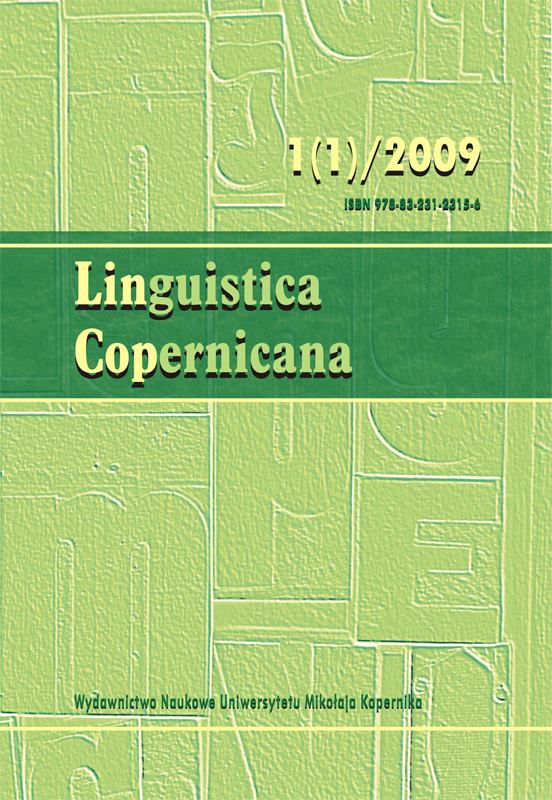O absurdzie. Rozważania semantyczne
DOI:
https://doi.org/10.12775/LinCop.2009.005Słowa kluczowe
współczesny język polski, semantyka, wyrażenia epistemiczne i wartościująceAbstrakt
The present article aims at analysing the meaning of the Polish word absurd ‘absurd’. In my discussion, especially at the beginning, I refer to my previous observations concerning the meaning of the word nonsens ‘nonsense’. Further absurd ‘absurd’ is compared with another expression which is semantically synonymous, namely with the predicate dziwne‘strange / odd’. The compared units to nonsens, że_ ‘it is nonsense that_’ and to absurd, że_ ‘it is absurd that _’ differ from each other mainly in that the former refers to what somebody has said about something (it has a metalinguistic reference), whereas the latter to what has happened, that is to events and the state of affairs (it has a situational reference). These referential differences influence the semantic range of the analysed expressions. The main difference between the predicate absurd ‘absurd’ and dziwne ‘strange / odd’, however, is that the absurd requires the agent, which is not necessarily the case with astonishment: compare the acceptable sentence To dziwne, że o tej porze roku pada śnieg / talerzyk przesunął się po stole ‘It is strange that it is snowing at this time of the year / that the plate has moved on the table’ with the unacceptable sentence *To absurd,że o tej porze roku pada śnieg / talerzyk przesunął się po stole ‘*It is absurd that it is snowing at this time of the year / that the plate has moved on the table’ (see examples (13) and (14)). Distinctive semantic features of the eponymous expression are contained in its definition (see (35)), being the outcome of the semantic interpretation presented in this paper.
Bibliografia
ANTAS J., 1983, Dystrybucja semantyczna niektórych terminów i pojęć filozoficznych na tle ich znaczeń potocznych, Zeszyty Naukowe Uniwersytetu Jagiellońskiego. Prace Językoznawcze, z. 73, s. 39–58.
BOGUSŁAWSKI A., 2003, Aspekt i negacja, Warszawa: Semiosis Lexicographica.
CHMIELEWSKI A., 1998, Przygodność i absurd istnienia, czyli o prawomocności etycznych strategii sensotwórczych, w: R. Różanowski (red.), Absurd w filozofii i literaturze, Wrocław: UWr, s. 125–163.
CHMIELEWSKI J., 1981, Zasada redukcji do absurdu na tle porównawczym, w: J. Pelc (red.),Studia Semiotyczne XI, s. 21–106.
GROCHOWSKI M., 1993, Konwencje semantyczne a definiowanie wyrażeń językowych, Warszawa: Zakład Semiotyki Logicznej UW.
GRODZIŃSKI E., 1981, Zarys teorii nonsensu, Wrocław: PAN Instytut Filozofii i Socjologii.
ISJP: Inny słownik języka polskiego, M. Bańko (red.), t. 1–2, Warszawa: PWN 2000.
JANUS E., 1977, Wykładniki intensywności cechy we współczesnej polszczyźnie, Polonica 3, s. 47–57.
KOTARBIŃSKI T., 1990, Elementy teorii poznania, logiki formalnej i metodologii nauk, Wrocław: PAN. Komitet Nauk Filozoficznych.
MEL: Mała encyklopedia logiki, W. Marciszewski (red.), Wrocław: Zakład Narodowy im. Ossolińskich 1970.
PELC J., 1981, O znaczeniach słów „sens” i „znaczenie”, Przegląd Humanistyczny 25, s. 1–10.
RÓŻANOWSKI R., 1998, Absurd nasz powszedni, w: R. Różanowski (red.) Absurd w filozofii i literaturze, Wrocław: UWr, s. 36–47.
SJPSz: Słownik języka polskiego, M. Szymczak (red.), t. 1–3, Warszawa: PWN 1988–1989.
SWJP: Słownik współczesnego języka polskiego, B. Dunaj (red.), Warszawa: Wilga 1996.
USJP: Uniwersalny słownik języka polskiego, S. Dubisz (red.), t. 1–5, Warszawa: PWN
WOŁK M., 2007a, W stronę semantyki nonsensu, Prace Filologiczne, t. 52, s. 409–418.
WOŁK M., 2007b, Cechy syntaktyczne wyrażeń nonsens i absurd. Wprowadzenie do opisu semantycznego, w: Beiträge der Europäischen Slavistischen Linguistik (POLYSLAV),t. 10, B. Bremher, V. Ždanova, R. Zimny (red.), München: Otto Sagner, s. 178–187.
Pobrania
Opublikowane
Jak cytować
Numer
Dział
Statystyki
Liczba wyświetleń i pobrań: 1698
Liczba cytowań: 0



